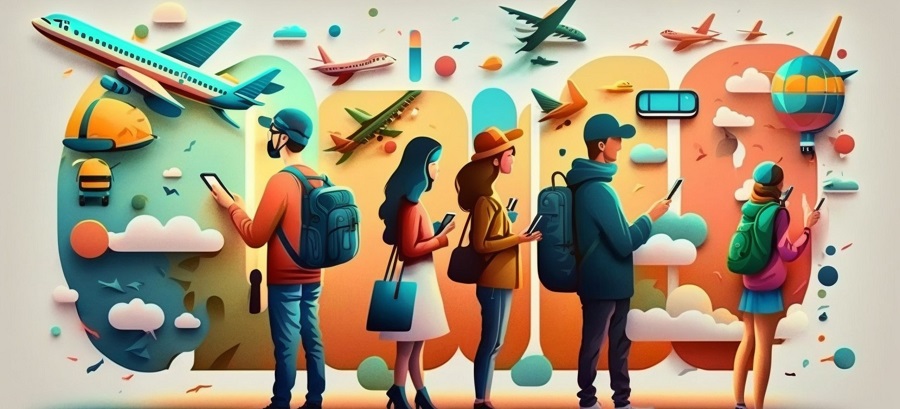Innovative marketing is crucial in the travel industry due to its highly competitive nature and travelers’ ever-evolving preferences. According to a report by Allied Market Research, the global travel market is expected to reach $9 trillion by 2025, so the significance of leveraging cutting-edge travel marketing campaigns cannot be overstated.
In an era where digital transformation dictates consumer behavior, travel companies must adopt advanced marketing techniques to stand out. Personalized marketing, driven by big data and AI, allows businesses to tailor their offerings to individual preferences, enhancing customer satisfaction and loyalty. Additionally, leveraging social media platforms and influencer partnerships enables companies to reach a broader audience and build authentic connections with potential travelers.
So, let’s discover some great cases!
Marriott International’s Social Media Engagement Strategy
Marriott International launched a dynamic social media campaign to drive engagement and enhance brand awareness. The campaign was strategically designed to harness the power of social media influencers, encourage user-generated content, and deploy targeted advertising to reach specific demographics.
Strategies:
- Influencer Partnerships: Marriott collaborated with prominent social media influencers who showcased unique travel experiences at various Marriott properties. With their extensive and engaged follower bases, these influencers provided authentic and visually appealing content that resonated with potential travelers. By sharing their experiences, these influencers amplified Marriott’s brand message and attracted new audiences.
- User-Generated Content with #MarriottMoments: To foster a sense of community and encourage participation, Marriott launched the branded hashtag #MarriottMoments. This initiative invited guests to share their memorable experiences at Marriott locations across social media platforms. By featuring user-generated content, Marriott increased engagement and built a repository of genuine testimonials and vivid imagery that highlighted the diverse and enriching experiences offered by their properties.
- Targeted Advertising: Marriott utilized targeted ads to reach specific demographics, ensuring that its promotional efforts were directed toward audiences most likely to be interested in its offerings. By analyzing user data and behaviors, Marriott crafted personalized advertisements that spoke directly to the needs and preferences of potential guests. This targeted approach maximized the efficiency of its advertising spend and drove higher conversion rates.
Key Takeaways:
- The campaign underscored the value of partnering with influencers to expand reach and enhance credibility. Influencers brought an element of authenticity and relatability, making Marriott’s properties more appealing to diverse audience segments.
- Encouraging user-generated content through the #MarriottMoments hashtag created a buzz around the brand. It fostered a sense of community among guests. This strategy increased engagement and provided Marriott with a wealth of organic content that showcased the positive experiences of real customers.
- Targeted ads proved effective in reaching the right audience with the right message. By tailoring their advertising efforts to specific demographics, Marriott maximized their campaign’s impact and drove significant increases in social media engagement and direct bookings.
Results:
Marriott International’s social media campaign successfully demonstrated the importance of leveraging social media influencers, creating engaging content, and employing targeted advertising. The campaign led to a notable surge in social media engagement and a measurable increase in direct bookings. Through strategic use of social media, Marriott not only elevated its brand presence but also reinforced its position as a leader in the hospitality industry, adept at connecting with the modern traveler.
Airbnb’s Personalization and Data-Driven Marketing
Airbnb has centered its marketing strategy on personalization to enhance the user experience and drive bookings. By leveraging big data and artificial intelligence (AI), Airbnb aims to provide users with tailored travel recommendations and personalized email marketing that resonate with their preferences and behaviors.
Strategies:
- Big Data and AI Analysis: Airbnb employs sophisticated big data and AI tools to analyze vast amounts of user data, including browsing history, previous bookings, search queries, and even social media activity. By understanding user preferences and behavior, Airbnb can create detailed user profiles that inform its personalization efforts.
- Personalized Travel Recommendations: Using data analysis insights, Airbnb provides personalized travel recommendations to users. These suggestions are tailored to individual preferences, such as preferred destinations, types of accommodations, and travel activities. By offering relevant and appealing options, Airbnb enhances the user experience and increases the likelihood of bookings.
- Tailored Email Marketing: Airbnb also leverages its data-driven insights to craft personalized email marketing campaigns. These emails contain customized content, including travel recommendations, special offers, and updates aligned with the recipient’s interests and past interactions with the platform. This targeted approach ensures that users receive relevant and engaging communications, fostering a stronger connection with the brand.
Key Takeaways:
- Airbnb’s approach demonstrates the significant impact of data-driven personalization in enhancing the customer experience. By delivering content and recommendations that align with individual preferences, Airbnb creates a more engaging and satisfying user journey.
- Personalized travel recommendations and tailored email marketing have led to a substantial rise in user engagement. Users are more likely to interact with content that resonates with their interests, leading to higher engagement rates on the platform.
- Personalized marketing efforts have also resulted in increased booking rates. By providing users with relevant and appealing options, Airbnb has successfully driven conversions, translating into higher booking rates and revenue growth.
Results:
Airbnb’s focus on personalization and data-driven marketing has proven to be highly effective. The company reported a significant increase in user engagement and booking rates, underscoring the value of leveraging big data and AI to enhance the customer experience. By prioritizing personalization, Airbnb has strengthened its position in the competitive travel and hospitality market, demonstrating that a tailored approach can drive meaningful business outcomes.
Expedia’s Integrated Multi-Channel Approach
Expedia implemented a comprehensive multi-channel marketing campaign designed to deliver a seamless user experience across various platforms. This approach focused on maintaining consistent branding and messaging while engaging users through multiple touchpoints in their travel planning journey.
Strategies:
- Consistent Branding and Messaging: Expedia ensured its branding and messaging were uniform across all channels, including social media, email marketing, and search engine optimization (SEO). This consistency helped reinforce brand recognition and trust among users, making their interactions with Expedia cohesive regardless of the platform.
- Strategic Content Placement: Expedia employed strategic content placement to enhance its SEO and engage users at different stages of the travel planning process. They created high-quality blog posts, travel guides, and other content that provided valuable information and inspiration. This content was optimized for search engines to attract organic traffic. It was shared across social media and email campaigns to reach a broader audience.
- Multi-Channel Engagement: By leveraging social media, email marketing, and SEO, Expedia could engage users through various touchpoints. Social media campaigns fostered real-time interaction and community building, while email marketing provided personalized offers and updates. SEO efforts ensured that Expedia remained visible and accessible to users searching for travel information online.
Key Takeaways:
- Expedia’s campaign highlighted the effectiveness of an integrated marketing approach in maintaining brand consistency and maximizing reach. Expedia created a unified brand presence that resonated with users by ensuring that all channels worked together seamlessly.
- The consistent and engaging user experience across multiple platforms contributed to improved user retention. Due to the reliable and cohesive experience they encountered, users were more likely to return to Expedia for future travel planning.
- The multi-channel strategy also led to increased bookings. Expedia successfully converted interest into action by engaging users at various stages of their journey and providing valuable content and personalized offers, driving higher booking rates.
Results:
Expedia’s integrated multi-channel marketing approach effectively demonstrated the benefits of maintaining consistent branding and messaging across various platforms. The strategic use of content placement, combined with a cohesive engagement strategy, resulted in enhanced user retention and a significant increase in bookings. This approach underscores the importance of a unified marketing strategy in achieving business success in the competitive travel industry.
Booking’s Sustainable Travel Campaign
Booking launched a pioneering campaign to promote sustainable travel options, aligning with the growing eco-conscious values of modern travelers. This initiative spotlighted eco-friendly accommodations and practices, encouraging travelers to make more environmentally responsible choices.
Strategies:
- Highlighting Eco-Friendly Accommodations: B.com focused on promoting properties that implemented sustainable practices. This included accommodations with energy-efficient systems, waste reduction measures, and sustainable materials sourcing. By showcasing these eco-friendly options, B.com made it easier for travelers to find and choose sustainable stays.
- Partnerships with Sustainable Brands: The campaign featured collaborations with brands and organizations dedicated to sustainability. These partnerships helped amplify the message of eco-friendly travel, providing additional resources and incentives for travelers to adopt sustainable practices. These collaborations also enhanced Booking’s credibility and reach.
- Educational Content on Reducing Travel Carbon Footprint: Booking created and disseminated educational content aimed at helping travelers reduce their carbon footprint. This included tips and guides on eco-friendly travel habits, such as using public transportation, reducing plastic usage, and supporting local communities. By educating travelers, Booking.com empowered them to make more informed and sustainable choices.
- Introduction of the “Travel Sustainable” Badge: To recognize and promote properties that meet specific sustainability criteria, Booking introduced the “Travel Sustainable” badge. This badge served as a marker for travelers looking for verified eco-friendly accommodations, making it easier to identify and select properties committed to sustainability.
Key Takeaways:
- The campaign underscored the increasing significance of sustainability in the travel industry. As more travelers prioritize eco-conscious choices, sustainability marketing strategies become essential for attracting and retaining customers.
- The campaign successfully raised awareness about the availability and benefits of sustainable travel options. By highlighting eco-friendly accommodations and providing educational content, B.com helped shift traveler preferences towards more sustainable choices.
- By aligning with the values of eco-conscious travelers, B.com improved customer loyalty. Travelers who prioritize sustainability were more likely to choose B.com for their travel needs, appreciating the platform’s commitment to promoting environmentally responsible practices.
Results:
B.com’s Sustainable Travel Campaign effectively demonstrated the critical role of sustainability in modern travel marketing. The strategic focus on eco-friendly accommodations, partnerships with sustainable brands, educational content, and introducing the “Travel Sustainable” badge led to increased awareness and adoption of sustainable travel practices. This campaign attracted eco-conscious travelers and strengthened customer loyalty, positioning Booking.com as a leader in promoting sustainable travel in the competitive travel industry.
Build your marketing strategy with COAX
COAX, a digital product marketing agency, can significantly enhance travel businesses’ marketing strategies. By leveraging data-driven insights and analytics, COAX helps travel companies understand customer behavior and optimize their campaigns for maximum impact. Their expertise in SEO and content marketing ensures higher search engine rankings and increased organic traffic, while targeted social media marketing campaigns boost brand awareness and engagement.
COAX’s performance marketing strategies focus on achieving measurable outcomes, ensuring travel businesses get the best return on their marketing investments. COAX helps travel companies attract and retain customers through these tailored services, driving growth and success in a competitive market.





